- Home
- Isuna Hasekura
Spice and Wolf, Vol. 5 Page 2
Spice and Wolf, Vol. 5 Read online
Page 2
Not that she was so insignificant as to warrant that kind of worry, Lawrence found himself thinking.
The wagon inched forward in the slow-moving line, and a great puff of white fog issued from beneath Holo’s hood as she looked at him irritably.
“Some stew would be nice,” she said.
No doubt she was talking about dinner. Evidently the time for affirmations had passed.
“Aye, with this cold. Depending on the price, I’d take a stew with a proper thick flour broth.”
“Ho, ho! Sometimes the sweet smell of milk surpasses that of the finest wine.”
Seeing her like this, face half-wrapped in the fox fur muffler as she nodded her delighted agreement, erased the past several days of irritated remarks he’d endured.
Sometimes it was good to order something full of tasty ingredients. “A stew made with the vegetables of the season would be especially good,” said Lawrence.
“Vegetables? Do you not understand the flavor of delicious stewed meat floating in the creamy broth?”
Despite having spent centuries in the wheat fields, Holo’s tastes were more aristocratic than any noble’s.
There before the walls of Lenos, Lawrence made one last counterattack. He regretted having indulged her.
“They say fine foods can be bad for the eye and bad for the tongue.”
“Oh? And how bad for my heart do you think it was to go so many centuries without so much as a taste?” Holo glared up at him sharply.
She was completely unmoved, her red-tinged chestnut eyes glinting like polished jewels.
In front of such shining gems, the only thing to do was fall to your knees.
But Lawrence was a merchant, not some jewel-crazed noblewoman. If the price wasn’t right, there was only one thing to say, even in the face of the most precious gem.
“Perhaps once I’ve consulted my coin purse.”
Holo looked away like a stubborn child.
Even after this exchange, Lawrence knew it was likely that they would wind up having a meat stew. No doubt Holo was confident of this as well.
And yet still they played at arguing.
Lawrence flicked the reins and eased the wagon forward.
As they passed through the checkpoint, Lawrence looked up at the stone wall, which was moss colored from the rain.
He looked down again shortly, though it was not to hide any of his goods from the import tax. No, he wanted only to hide the smile that spread under his beard.
Perhaps it was because of the cold winter rain that there were so few people in the town’s streets.
What few were there were mostly children, the mist of their exhalations trailing behind them as they ran here and there with hands clasped tight to their breasts—no doubt on errands for the town’s shopkeepers and craftsmen. The phantomlike forms with their bundles of rags were surely doing the same job.
The stalls that faced the street were largely unattended as the light mist gathered and dribbled from their eaves. Without any shopkeepers to chase them away, a few beggars gathered under a handful of the stalls. It was the very image of a rainy day.
But the fact that just outside the entrance to the town walls there were tents lined up with merchants cooking dinner beneath them meant something was afoot.
Lawrence held in his hand the wooden plaque he’d received at the checkpoint that was proof of his status as a foreign merchant, and listened vaguely as Holo voiced her displeasure.
“’Tis not as though I would place it at the very pinnacle of creation, but is that not an unreachable state, not some matter of relative merit? What say you?”
“Oh, indeed.”
“If we are to talk of that which falls short of being inherently superior and that which exceeds its humble origins to become great, I should think the latter more worthy of respect. Am I wrong?”
“…Not at all.”
Perhaps it was the fatigue of the long journey. Holo’s anger was not the complete rage it normally seemed to be. She expressed her displeasure as a lower, more constant grumble.
In his mind, Lawrence cursed the loudmouthed checkpoint guard whose careless words had brought this upon him—but then he realized that if his replies to Holo were too perfunctory, she’d turn her anger upon him.
“Yes, well, if the choice is between a nobleman with no fame, no charisma, no assets, naught but his lineage, and a canny commoner who’s amassed wealth and fame, then surely it’s the latter whom I’d respect,” agreed Lawrence.
Normally such obsequiousness would only worsen Holo’s mood, but at the moment it seemed to be good enough.
She gave an exaggerated, almost drunken nod, then sniffed like an angry bull.
At the checkpoint, they’d been subjected to an extremely thorough search, and the guard had discovered Holo’s tail.
Of course, Holo was nonchalant as always and easily passed it off as an underskirt, which the guard seemed to believe, but then he had said this:
“Oh, just a cheap wolf skin.”
Being a guard at a town that was a hub for lumber and fur, he’d known how to tell a wolf pelt from a dog or a fox.
And he was not wrong about the value. Wolf pelts were ranked below dog. No matter how fine the quality, no matter how much it made a fur trader drool, the simple fact was that it would never be worth as much as a good deerskin.
The problem arose when that wolf’s pride was not so cheap as its fur—and on that count, Holo was expensive indeed.
This explained her angry, childish muttering. Lawrence felt so bad for her that he wanted to stroke her head to comfort her.
Had they still been midjourney, he might have simply held the reins and exchanged snippy remarks with her, but now he only looked at her out of the corner of his eye. He scratched his chin with the corner of the foreign merchant plaque, wondering if some food would help her feel better.
In truth, Lawrence was more concerned with the significance of that plaque.
It appeared hastily made without any kind of official seal on it.
He’d been told that if he wanted to buy commodities in the village, no one would sell to him unless he displayed the plaque.
That was the only explanation he had received. He’d been quickly shooed through the checkpoint, through which a string of travelers passed like an eel wriggling through a trap.
It was a situation no merchant could abide.
This was the first time he’d encountered something like this—not just in Lenos, but in any town.
“So then,” said Holo.
“Oh, uh, yes?” A poke at his leg jerked Lawrence out of his reverie, and he met Holo’s sharp gaze.
For a moment he wondered if he’d missed her saying something, but before he could ask, Holo continued.
“Will we make the inn soon?”
No doubt she was cold and hungry and could not tolerate riding in the wagon any longer than she had to. “Just ahead around that corner,” Lawrence told her. She gave an irritated sigh at the fact that the inn was not immediately in front of her, sinking deeper into her hood.
He would have to be very careful about the amount of meat in tonight’s stew. Lawrence thought the matter over as he drove the wagon, and soon enough they arrived at their destination.
It was an ordinary four-story building that somehow fell short of striking one as elegant.
The first floor, which faced the street, had a Dutch door. The lower section could be opened and turned sideways, becoming a surface on which to display goods, and the upper section could function as an awning. Both were currently closed fast, doing their best to hold back the cold winter air.
Holo’s expression only darkened. Perhaps she expected to be taken to an inn with a properly maintained facade.
Lawrence avoided explaining to her that even should they spend more money, it did not guarantee a restful inn. He climbed down from the driver’s box to avoid her baleful gaze and trotted over to the inn’s front door, giving it a knock.
&nb
sp; The inn did not have so much as a sign out front, so it was very unlikely to be full, but there was a real possibility that the owner could have closed up because of the cold weather.
So when Lawrence heard the shuffling of someone behind the door just before it opened a crack, he felt a certain amount of relief.
“You staying or selling goods?” a gruff, whitebearded old man brusquely demanded through the barely opened door.
“Staying. Two of us.”
The old man gave only a quick nod, then retreated back into the building.
The door was left open, so apparently there were vacancies.
Lawrence glanced back at the wagon. “Which do you want, a bright room or a warm room?” he asked.
The question was unexpected. A crease appeared on Holo’s brow. “What else is there but a warm room?”
“Right, I’ll take the horse around to the stables. You go on in and talk to the innkeeper—that older gentleman—and tell him that. He’ll show you to a room.”
“Mm.”
Lawrence climbed back into the driver’s box and took the reins, trading places with Holo, who got off. The horse, seeming to realize that he was finally about to get out of the driving winter wind and into a warm stable, shook his head as if to hurry them up. With a flick of the reins, Lawrence set the horse to walking, watching Holo enter the inn out of the corner of his eye.
He’d be able to pick her dusty, multilayered robe out of a crowd of a hundred people with no problem.
After all, no matter how many layers she wore, he’d recognize the movements of her swishing tail anywhere.
Smiling to himself, Lawrence guided the horse into the barn, wherein there were two beggars doing lookout duty. They gave Lawrence an appraising glance.
The lookouts never forgot a face, so naturally they remembered Lawrence, and with a gesture of their chins, pointed to where they wanted him to leave his horse. With no reason to refuse, Lawrence complied. In doing so, he noticed that next to his space was a wide-hooved mountain horse, which gave him a flinty glare from beneath its long, shaggy hair. No doubt it had hauled furs into town from the northlands.
“You two get along now,” said Lawrence, patting his own horse on its flank as he climbed down from the wagon, leaving the two beggars with two copper coins before gathering his belongings and heading into the inn.
This particular inn had once been the living quarters of a tannery. The first floor had been the leather strap makers’ workshop, and so it was mostly open with few walls and a stone floor. Now it was used to store things, and here and there were goods that various merchants had the inn keep under long-term storage.
Slipping past the jumbled piles of goods that were taller than he was, Lawrence arrived at the only orderly place on the first floor—the innkeeper’s room.
On a small table was an iron bowl held up in a three-legged iron brace. The innkeeper burned charcoal in the bowl and drank mulled wine all day, daydreaming of far-off lands. “Next year, I’m going south on pilgrimage,” he would frequently say.
The innkeeper noticed Lawrence, looking at him with keen blue eyes beneath bushy brows. “Third floor. Window side.”
“Right, third floor—wait, window side?”
Though inn patrons could either pay in advance or at the end of their stay, the stoic innkeeper’s mood was improved by pay in advance. Lawrence had thus placed a moderately generous fee on the table, but the innkeeper’s words came as a surprise, making him turn around.
“Window side,” said the innkeeper again in a low voice, closing his eyes.
The old man did not want to discuss the matter.
Lawrence nodded his head. Oh well, he thought to himself as he left the room.
Holding the handrails stained with age and use, he went up the stairs.
Just like the living quarters of any other workshop, on the second floor was a living room with a fireplace, a kitchen, and the master’s bedroom. This building was a bit different in that the fireplace was in the center of the living room, and the rooms on the third and fourth floors were built to get as much heat as possible from the chimney that led upwards through the inn.
In addition to the somewhat strange layout that this necessitated, the maintenance necessary to ensure that smoke didn’t leak from the chimney and into the rooms was often troublesome. The master of this building, however, had chosen the comfort of the apprentices that would live on the third and fourth floors.
The current innkeeper was a kind, if quiet man. His name was Arold Ecklund, and he had been the head craftsman of the tannery.
When night fell, the odd downstairs living room would be filled with friendly chatter as the guests each came bearing various wines. Now, though, all that could be heard was the quietly crackling fire.
There were four rooms on the third floor.
Back when the building had been a workshop, the fourth floor was used for new apprentices and as storage for odds and ends, so the third-floor rooms were larger.
But not all of those rooms received the benefit of the warmth from the chimney. Only one of the third-floor rooms faced the street, and in order to accommodate a window to let in light, it sacrificed access to the chimney.
In other words, having a window meant sacrificing heat.
Lawrence was sure that Holo had said she preferred a warm room. As he entered their quarters, he saw that she’d already taken off and scattered all her wet clothes everywhere and was huddled beneath the covers of her bed.
He wondered if she was crying from the indignity of it all, but looking at the way she lay curled up in the blanket, she seemed to have fallen asleep.
Staying angry for so long must have tired her out, Lawrence supposed.
He gathered up her discarded clothes, draping them temporarily over the back of a chair, and he removed his own traveling garb. This was the most relieving part of any journey—the moment when he could remove his wet things at an inn. They felt like damp clay as he peeled them off, set them aside, and changed into his normal clothes, which hadn’t yet been soaked with rain.
His standard outfit was admittedly cold, but it was still better than staying wet.
Without a fireplace, the room would be no warmer than a campsite once night fell.
A mere blanket wouldn’t be enough to stave off the chill. He realized this as he bundled up Holo’s heavy, rain-soaked clothing like a manservant.
Holo’s tail stuck out from underneath the blanket, which otherwise looked as if it had been thrown over a pile of bread, cheese, or bacon.
She really didn’t play fair, thought Lawrence.
It wasn’t quite the same thing as a nobleman’s daughter flashing her long, beautiful hair out the window of her chamber to catch the eye of a passing knight—but nonetheless, Lawrence felt compelled to respond.
“I think your tail is lovely; it’s warm with fine fur.”
A moment passed, and Holo pulled her tail in underneath the blanket.
Lawrence could only heave a sigh.
Holo was hardly the sort of sensitive girl whose wounded feelings could be soothed with a single compliment from him. Even at this very moment, she surely still harbored a smoldering grudge.
And yet she had gotten Lawrence to praise her tail.
Lawrence smiled ruefully to himself as he descended the stairs, sighing again. In her own way, Holo relied on him. That was all the reason he needed.
It could be one of her clever traps, but being caught in them wasn’t such a bad feeling.
He took advantage of the fact that a mind-reading wolf wasn’t planted next to him to mull over such thoughts as he entered the living room, which housed the fireplace.
There was no one there. His only company was the echoes of the crackling firewood.
Furniture was scarce. A single chair was illuminated by the flickering light of the fire. That chair alone wouldn’t be enough to dry the bundle of clothes Lawrence held in both arms, but he was unconcerned.
Here a
nd there on the walls of the living room were nails that had been only half pounded in, their heads turned up to act as hooks. A leather strap dangled from one of them, long enough to be connected to a hook on the opposite wall. On rainy days, this was excellent for drying the clothes of sodden travelers, and on clear days, it worked well for drying vegetables and meat to serve as supplies for people resuming their journeys.
Lawrence quickly set up the line and hung the wet clothes across it.
The robes were larger than he’d reckoned, and he wound up having to use the entirety of the line.
“Just so long as no one else comes to dry their clothes,” Lawrence murmured to himself as he sat down on the single chair before the fireplace.
The next moment, he heard the creaking sound of the staircase.
“…”
Apparently the creak had actually come from the hallway.
Lawrence turned his gaze toward the sound and met the eyes of a figure who had climbed up the stairs and now peered into the living room.
His head was wrapped in a cowl, which also covered most of his face, obscuring whatever expression he might have had, but his gaze was keen and steady. He was not especially tall, but neither short—perhaps a bit taller than Holo.
His traveling clothes were heavy and squared his figure. The most outstanding feature of the fellow’s attire were his leather boots with thick, leather strap work that bound them to his calves. They were proof of a traveler who eschewed horseback in favor of his own two feet, and the tightness with which the straps were tied was evidence of the severity of the season.
The pale blue eyes that regarded Lawrence through the gap in those heavy layers of clothing were pure and keen—and unsympathetic.
After giving Lawrence a long, appraising look, the figure continued wordlessly up the stairs.
Despite carrying a heavy load, his footsteps were nearly silent.
The stranger also seemed to have secured a third-floor room. From above his head, Lawrence heard a door open, then close.
Arold mostly left his guests alone, which made his inn particularly prized among those who weren’t interested in being sociable. Even among merchants, not all of them were extroverts.

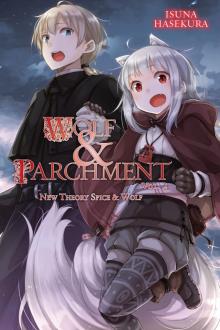 Wolf & Parchment, Volume 2
Wolf & Parchment, Volume 2 Wolf & Parchment, Volume 3
Wolf & Parchment, Volume 3 Spring Log II
Spring Log II Spring Log IV
Spring Log IV Wolf & Parchment: New Theory Spice & Wolf, Vol. 4
Wolf & Parchment: New Theory Spice & Wolf, Vol. 4 Spring Log III
Spring Log III Spice & Wolf IV
Spice & Wolf IV Spice & Wolf X (DWT)
Spice & Wolf X (DWT) Spice and Wolf Vol. 2
Spice and Wolf Vol. 2 Spice & Wolf XIII (DWT)
Spice & Wolf XIII (DWT) Spice and Wolf, Vol. 10
Spice and Wolf, Vol. 10 Spice & Wolf XVI (DWT)
Spice & Wolf XVI (DWT) Town of Strife I
Town of Strife I Spice and Wolf, Vol. 5
Spice and Wolf, Vol. 5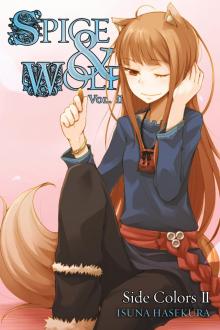 Side Colors II
Side Colors II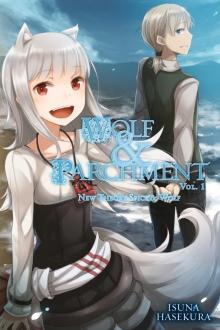 Wolf & Parchment, Volume 1
Wolf & Parchment, Volume 1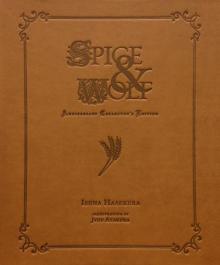 Spice & Wolf Omnibus
Spice & Wolf Omnibus Spice & Wolf XII (DWT)
Spice & Wolf XII (DWT) spice & wolf v3
spice & wolf v3 Spice & Wolf
Spice & Wolf Spice & Wolf VIII (DWT)
Spice & Wolf VIII (DWT) Spice and Wolf, Vol. 4
Spice and Wolf, Vol. 4 Spice & Wolf XIV (DWT)
Spice & Wolf XIV (DWT) Spring Log
Spring Log Spice & Wolf III
Spice & Wolf III Spice & Wolf VII - Side Colors
Spice & Wolf VII - Side Colors Spice & Wolf XV (DWT)
Spice & Wolf XV (DWT) Side Colors
Side Colors Side Colors III
Side Colors III Spice & Wolf VI
Spice & Wolf VI Spice & Wolf IX (DWT)
Spice & Wolf IX (DWT) Spice & Wolf V
Spice & Wolf V Town of Strife II
Town of Strife II Spice & Wolf XI (DWT)
Spice & Wolf XI (DWT) Spice and Wolf, Vol. 12
Spice and Wolf, Vol. 12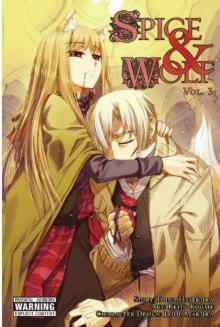 Spice and Wolf, Vol. 3
Spice and Wolf, Vol. 3 Spice and Wolf, Vol. 1
Spice and Wolf, Vol. 1 Spice & Wolf XVII (DWT)
Spice & Wolf XVII (DWT) Spice and Wolf, Vol. 6
Spice and Wolf, Vol. 6 Spice & Wolf II
Spice & Wolf II